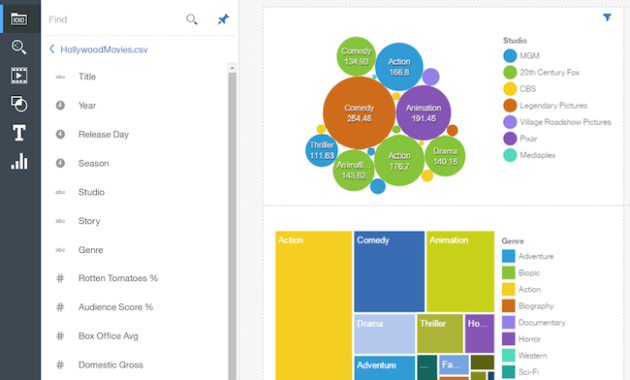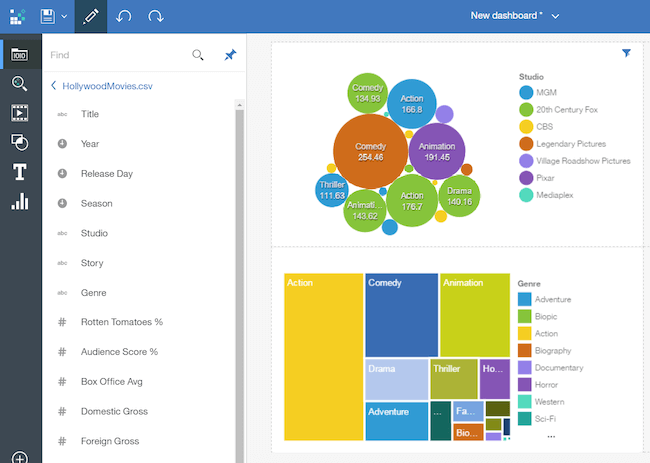
Business Intelligence Tools That Democratize Company Data: Empowering Everyone
In today’s data-driven world, the ability to understand and leverage information is paramount. Traditionally, accessing and analyzing company data was the domain of specialized teams. Data scientists and analysts held the keys to unlocking insights. This created bottlenecks and limited the potential of data. However, a shift is underway. Business intelligence (BI) tools are democratizing data, putting its power in the hands of everyone. This transformation is changing how companies operate, make decisions, and innovate. This article will explore the rise of these tools and their impact.
The core concept is simple: data democratization. It means making data accessible to all authorized users within an organization. This includes employees, regardless of their technical expertise. Business intelligence tools are the enablers of this shift. They provide user-friendly interfaces and powerful analytical capabilities. This allows individuals to explore data, generate reports, and make informed decisions. The result is a more data-literate workforce. It leads to better decision-making across all departments.
The Evolution of Business Intelligence
The journey of BI tools is fascinating. It reflects the evolution of technology and business needs. Early BI systems were complex and expensive. They required specialized skills to implement and maintain. These systems were often limited to large corporations. Smaller businesses were left behind. The focus was on IT-driven reporting. The end-users had limited control. The process was time-consuming and inefficient.
Over time, the landscape changed. The rise of cloud computing and Software-as-a-Service (SaaS) models made BI tools more accessible. These tools are now more affordable and easier to deploy. They offer intuitive interfaces and drag-and-drop functionality. This allows non-technical users to create dashboards and analyze data. This shift marked the beginning of data democratization. The focus moved from IT to the business users. This allows them to control their data and insights.
Today’s BI tools are more sophisticated than ever. They integrate with various data sources. They offer advanced analytics capabilities. They also leverage artificial intelligence (AI) and machine learning (ML). These features automate insights and predict future trends. The evolution of BI tools is ongoing. It is driven by the need for faster and more accurate insights.
Key Features of Democratized BI Tools
What distinguishes modern BI tools that empower data democratization? Several key features are essential. These features make data accessible and actionable for everyone in an organization.
- User-Friendly Interfaces: Intuitive interfaces are crucial. They allow users with minimal technical skills to explore data. Drag-and-drop functionality, pre-built templates, and interactive dashboards are common.
- Data Visualization: Effective data visualization is essential for understanding data. BI tools offer various chart types and graphs. This makes it easier to identify trends and patterns.
- Data Integration: The ability to connect to various data sources is critical. BI tools should integrate with databases, cloud services, and spreadsheets. This provides a unified view of all data.
- Self-Service Analytics: Self-service analytics empowers users to analyze data independently. Features like ad-hoc reporting and data exploration tools are essential.
- Mobile Accessibility: Mobile BI allows users to access data from anywhere. Mobile apps and responsive designs are increasingly common features.
- Collaboration Features: Collaboration features enable users to share insights. These features include commenting, annotations, and data sharing.
- AI-Powered Insights: AI and ML capabilities are becoming more prevalent. These features automate insights and predict future trends.
Benefits of Democratizing Company Data
The benefits of democratizing company data are numerous. They extend across the entire organization. It leads to improved decision-making, increased efficiency, and greater innovation. These benefits are driving the adoption of business intelligence tools.
- Improved Decision-Making: Empowering employees with data leads to better decisions. Decisions are based on facts, not gut feelings. This improves the accuracy of business decisions.
- Increased Efficiency: Data-driven insights can streamline processes. Employees can identify bottlenecks and optimize workflows. This increases overall efficiency.
- Enhanced Collaboration: Data democratization fosters collaboration across departments. Employees can share insights and work together. This improves teamwork.
- Greater Innovation: Access to data can spark new ideas and innovations. Employees can identify new opportunities and improve products. This enhances innovation.
- Faster Time to Insights: Democratized BI tools provide quicker access to insights. This allows businesses to respond faster to market changes. This enhances agility.
- Cost Savings: By empowering employees, businesses can reduce reliance on IT. This lowers the costs associated with data analysis.
Examples of Business Intelligence Tools
Several BI tools are available in the market. They cater to a variety of needs and budgets. Some popular tools include:
- Tableau: Tableau is a leading BI tool. It is known for its data visualization capabilities. It offers a user-friendly interface and powerful analytics features.
- Microsoft Power BI: Power BI is a popular choice. It integrates seamlessly with Microsoft products. It is known for its affordability and ease of use.
- Qlik Sense: Qlik Sense is another powerful BI tool. It offers associative data modeling. It allows users to explore data in new ways.
- Looker: Looker is a cloud-based BI platform. It is known for its data governance features. It allows businesses to manage data centrally.
- Sisense: Sisense is a BI platform. It is known for its in-memory processing. It offers fast and efficient data analysis.
These are just a few examples. The best tool depends on the specific needs of the business. Consideration should be given to factors such as data sources, budget, and technical skills. The goal is to find a tool that empowers employees. It should enable them to make data-driven decisions.
Implementing Data Democratization
Implementing data democratization is not a one-size-fits-all approach. It requires careful planning and execution. The following steps can help ensure a successful implementation:
- Define Goals and Objectives: Start by defining the goals of data democratization. What do you want to achieve? Identify specific business problems you want to solve.
- Assess Data Readiness: Evaluate the current state of your data. What data sources do you have? What is the quality of your data?
- Choose the Right Tools: Select BI tools that meet your needs. Consider factors such as ease of use and features.
- Develop a Data Governance Strategy: Data governance is essential for data democratization. Establish policies and procedures. Ensure data quality and security.
- Provide Training and Support: Training is crucial for user adoption. Provide training on how to use BI tools. Offer ongoing support.
- Promote Data Literacy: Foster a data-driven culture. Encourage employees to use data. Celebrate successes.
- Monitor and Evaluate: Track the progress of data democratization. Measure the impact on business outcomes. Make adjustments as needed.
Implementing data democratization is an ongoing process. It requires continuous effort and improvement. The goal is to create a data-driven culture. This culture empowers employees to make informed decisions.
Challenges and Considerations
While data democratization offers significant benefits, it also presents challenges. It is important to address these challenges proactively. Careful planning and execution can mitigate these risks.
- Data Quality: Poor data quality can undermine the value of BI tools. It is essential to ensure data accuracy and consistency.
- Data Security: Data security is a major concern. Implement robust security measures to protect sensitive data.
- Data Governance: Effective data governance is crucial. Establish policies and procedures. This ensures data is used responsibly.
- User Adoption: Getting employees to adopt BI tools can be challenging. Provide training and support. Promote data literacy.
- Data Overload: Too much data can be overwhelming. Focus on relevant data. Use data visualization to simplify insights.
- Lack of Skills: Not all employees have the same level of data literacy. Provide training and support to bridge the skills gap.
- Resistance to Change: Some employees may resist change. Communicate the benefits of data democratization. Encourage participation.
Addressing these challenges is essential for success. It is a key factor in the effective use of business intelligence tools. It leads to better decisions.
The Future of Data Democratization
The future of data democratization is bright. The trend is toward even greater accessibility. The tools will become more intuitive and powerful. The integration of AI and ML will accelerate insights. This will make data even more accessible to everyone.
Key trends shaping the future include:
- Increased Automation: AI and ML will automate more data analysis tasks. This will free up employees to focus on higher-level analysis.
- Enhanced Collaboration: BI tools will offer more collaboration features. This will improve communication and teamwork.
- Greater Personalization: BI tools will become more personalized. They will tailor insights to individual user needs.
- Edge Computing: Edge computing will enable real-time data analysis. This will improve responsiveness.
- Data Literacy as a Core Skill: Data literacy will become a core skill for all employees. Businesses will invest in data literacy training.
The future of data democratization is all about empowerment. It is about giving everyone the power to make data-driven decisions. It is about unlocking the full potential of data. This enables businesses to thrive in the digital age. This shift is driven by the Business Intelligence tools.
Conclusion
Business intelligence tools are transforming the business landscape. They are democratizing company data. This is empowering everyone to make data-driven decisions. This leads to better outcomes. These tools are crucial for any organization. They want to succeed in today’s data-driven world. By embracing data democratization, businesses can unlock their full potential. It fosters innovation and drives growth. Investing in BI tools is an investment in the future. It’s an investment in a more informed and empowered workforce. It is an investment in success. [See also: Related Article Titles]

